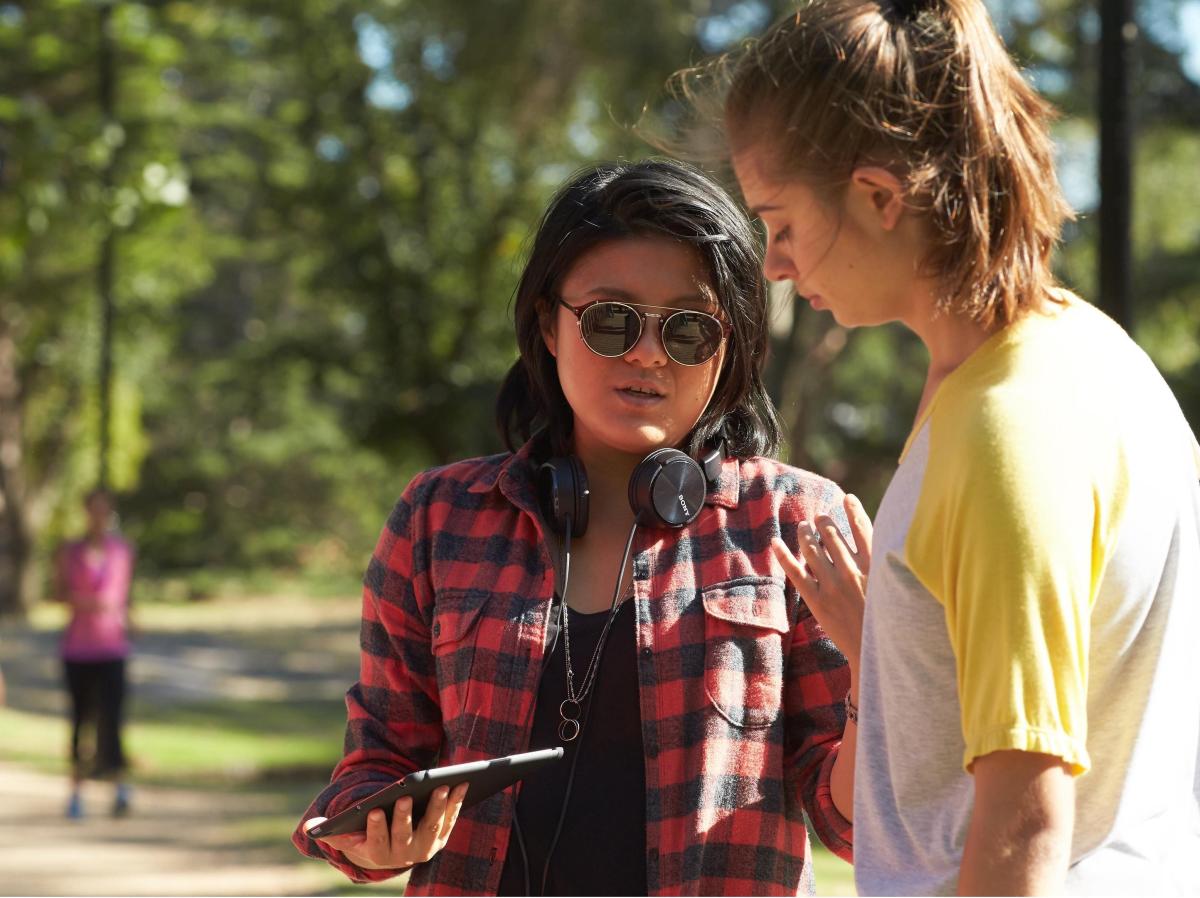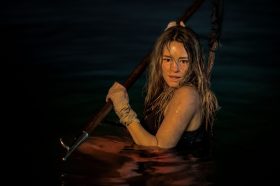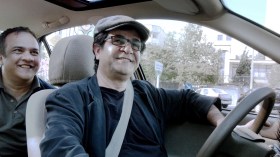Corrie Chen directing on the set of ABC teen comedy Mustangs FC. Source: supplied.
Corrie Chen is having a bright and busy year so far. Now in her early 30s, the director has just picture-locked on the set-up block of the second series of ABC ME teen comedy Mustangs FC, In April there was the debut of Homecoming Queens, the acclaimed SBS-commissioned short-form drama series. Already an AACTA Award-and ADG nominated short filmmaker, Chen is hoping to make her first feature soon, with a script supported by Screen Australia’s Gender Matters initiative. Right now though, as she speaks to Screenhub, she’s getting ready to hop on a plane to LA where she’ll participate in a directing lab supported by a Film Victoria development grant.
There’s always a danger in reading other people’s CVs and career bios: you see all the highlights and none of the struggles. Chen’s achievements to date are impressive, but she’s also a candid and funny storyteller, keen to point out all the years spent in the wilderness between graduating from film school and finally getting traction in TV.
Perseverance and luck
‘My agent Jennifer Naughton, who I’ve known since my first year out of VCA, has really helped shape my career, and I remember her saying to me that it would probably take five years to get my first job. At the time I was like, OMG, no way. But she was wrong. It took six years!’
What’s a young filmmaker supposed to do in those years? ‘Fuck, it takes such perseverance,’ remembers Chen. ‘It made me realise that you can be as talented as you like, but you also need luck and perseverance. If someone had made me aware of just how much sacrifice it was going to take to break through, I probably would have questioned my career choices a lot more than I did. In those five years I did a lot of note-taking in writers’ rooms. I did attachments, I applied for any grants I was eligible for, especially in short films and documentaries, which are a bit more open to new voices. The dream was always to work in feature film, but especially television, and I’m very pleased I’m here now.’
Television has always played a special role in Chen’s life. Born in Taiwan, she moved to Australia with her family at the age of nine. It was during the mid-90s around the height of the Pauline Hanson era. Chen didn’t speak any English, and due to visa holdups, wasn’t able to go to school for the first year and a half, so she was home-schooled – ‘by my mum, who also didn’t speak English.’
A lot of Bananas in Pyjamas and Sesame Street
‘I learnt by watching television, and mostly the ABC,’ says Chen. ‘I watched a lot of Bananas in Pyjamas and a lot of Sesame Street. I was raised on television. It was like another family member to me. Because of the language barrier, by the time I did get to school I really struggled making friends as well, but ABC and TV in general was such a big thing for me. I was so desperate to look more like this family member, and spent the majority of my teen years desperate to wake up white. So it’s a really nice homecoming to make children’s TV for the ABC. It really feels like I’ve come full circle.’
Understandably, it’s satisfying for Chen to be making a kids’ series like Mustangs FC with its racially diverse and female-led cast, telling the story of an all-girls’ football team.
This was Chen’s big break: in 2016 she was brought on by producers Rachel Davis and Amanda Higgs to direct three episodes of the first series of Mustangs FC. Higgs had become aware of the young director through the attachments she had done, including on the last season of HBO series The Leftovers. Then Chen’s feature project Empty Empire (formerly Strangers) was one of 45 projects to receive development funding through Screen Australia’s Gender Matters: Brilliant Stories in July 2016, which enabled her to travel to China on a research trip to pen her first draft. While she was overseas, she was interviewed for the job over Skype. More jobs followed quickly, including episodes of Network Ten’s Sisters (produced by Imogen Banks and Nicole O’Donohue) and the entire series of Homecoming Queens (produced by Katia Nizic and executive produced by Chen and Amanda Higgs).
‘I’ve had mentors who have been men and they’ve given me advice and time,’ says Chen. ‘But if I actually sat down and thought about the tangible milestones of my career that have come with a job, they’ve all been from women. It’s taken the generosity of others to help me break down that door and I wouldn’t be here without a tribe of very inspirational women who didn’t doubt me when I doubted myself. They offered real opportunities, not just theoretical support.’
Ticking the diversity boxes
Chen says she’s aware she needs to make hay while the sun shines. ‘I’ve realised this year that I have to really take advantage of this privileged time that we are in at the moment where someone like me might be sought after because I’m sort of ticking the boxes.’
The boxes she’s talking about are of course, gender diversity, racial diversity and the fact she’s part of the LGBTIQ+ community. As an Asian Australian female filmmaker, she’s exactly the kind of person progressive organisations want to be seen to support. On one level this is great, but on another it’s annoying because you’d like to be supported for talent and ability alone.
Ticking the boxes also brings about its own set of anxieties.
‘The industry that I’m longing to be a part of is one that just statistically does not include me,’ says Chen. ‘When I step on set I still have this anxiety. How am I supposed to lead a mostly white, mostly male crew when the definition of a director does not look like me in any way. And whether it’s just in my head or not, there’s a feeling that I can’t mess up, because if I mess up I’m messing up for everyone like me. If I make a mistake, it’s because I’m a woman, or an Asian woman. And I’m not saying there have been instances that I’ve felt that externally, but it’s something that I carry within me constantly.’
Given how hard she is on herself, how does she cope after a bad day on set? ‘I’m extremely glass half empty and it’s something that I’m trying to rectify. This can’t be emotionally good for me. I’m only at the start of my career. The easy thing is have a glass of wine and see what happens. It’s one of the hardest things. After every production I feel like my body is so physically wrecked and I need to re-engage with the world again. I’m trying to do yoga and meditation. It helps about five per cent of the time.’
Chen says she’s always grappling with her Asian Australian identity. ‘It’s embedded in the DNA of everything I do, and I’m proud of that.’ You can see her exploring this in many of her short films, like Happy Country (2008), Wonder Boy (2010) and Tinseltown (2016), but also in Homecoming Queens (perhaps the only Australian TV show to have both an Asian Australian director, writer and lead actress), and in Empty Empire, co-written with Penelope Chai.
Tinseltown from Corrie Chen on Vimeo.
Clara Law’s Floating Life – an inspiration
It’s not surprising that one of Chen’s favourite Australian films is Clara Law’s Floating Life (1996, also known as Fu Sheng), the moving story of a Hong Kong family migrating to Sydney. ‘I saw it in my very early 20s in my first year at VCA,’ she says. ‘It was the first time I’d seen an Australian screen story that had somebody in it that looked like me and whose story was me and my family. It gave me this profound experience of reconsidering my parents’ experience – moving here, and also my thrill of seeing my own childhood memories of Australia when we first landed. How bright it was and how quiet! My mum and I used to walk around the streets of our suburbs, horrified, and wondering where all the people were.’
‘In America they had Wayne Wang and Ang Lee who really looked at the late 80s and the experience of assimilation,’ remembers Chen, but what was so specific about Floating Life – and maybe because it’s a female filmmaker – was that it really connected the experiences of home with the concept of home which is quite Chinese, because it brought in the idea of Feng Shui and cutting off physical ties to your homeland as you seek a better life for the future generations. The old country and new country. And the thing about our screen culture is that it should provide at least some sort of muted hope for people who feel otherised. It should help them consider their spatial identity, because multiculturalism is such a part of the globalised world.’
When Chen gets tired of the identity discussion, she remembers how important it was for her to see other people out there, like Clara Law, being visible and expanding the definition of Australian screen stories. ‘I think because we have a small industry here, maybe there’s a tendency to go, “oh there’s one diversity poster girl, if you need one. Just hire her.” Whereas I’m more interested in holding the door open rather than closing it behind me.’
The word ‘tribe’ is important to Chen. She uses it a lot and says people like her and Michelle Law (one of her best friends) are definitely trying to get one going. ‘We look at the movement that is happening in the US with envy and excitement because we are ready for that to happen here. With a big film like Crazy Rich Asians, there’s a generation of Asian American actors, writers and directors coming together and empowering themselves. That’s not quite happening here yet. Michelle and I work together and Ben Law, her brother is very active in the industry. Tony Ayres is someone I look up to and has helped me as well. I’m pretty sure my first work experience back when I was at VCA was with his company. There are a small collection of us. But I can only really count them on one hand.’
Koalas, blow-up kangaroos and cheese sandwiches in Taiwan
Listening to Chen tell hilarious stories of her childhood, you can’t help hoping she gets to make an autobiographical comedy one day. ‘I come from a very long line of Asian stereotypes,’ she says. ‘My grandad was a rice farmer, my parents are small business owners, entrepreneurs. I don’t know where it started but my whole life I’ve known they were obsessed with Australia. We come from a small country town in Taiwan. In late 80s and early 90s they opened up an Australian themed restaurant called ‘Koala’ where the waiters wore cork hats and a menu of toasted cheese sandwiches,and there were inflatable boxing kangaroos everywhere. And when it sent them bankrupt because, shockingly, country Taiwanese people didn’t want eat cheese sandwiches, they went, “Oh well, let’s actually do the real thing and give it a go.” They came here with basically no money but a lot of enthusiasm about being Australian. And it’s still boggles me. I think my dad would have been about my age, and imagine dragging your whole family across the world and you don’t even speak the language. There’s an aspirational aspect to that, and I guess in my own way, being a filmmaker is like that, taking a very big chance and hoping it all works out.’
Corrie Chen’s tips for those just starting out
- Consider how much you actually want it, and if that desire is enough. I don’t think I realised how hard it was going to be, how much you actually have to sacrifice and what you give up in your personal life. Friendships or missed funerals or losing relationships, or even feeling like I was a disappointment to my parents for all of my 20s. Living off grants and little pieces here and there, it felt like I was on the poverty line. I saw all of my friends go on to buy houses and go on holidays.
- Remember this is a relationships business, and you only get traction if people want to work with you again. I have been lucky to have all these champions at funding bodies, certain producers, reminding me to keep persevering. People have to want to support you because everything is made through collaboration.
- Once you find those people, your tribe, hang onto them for dear life.
You can watch Homecoming Queens on SBS On Demand.
Corrie Chen will be speaking at several panels at the Melbourne Writer’s Festival.
- How I Survived: Corrie Chen and Michelle Law, Sat 25 August, 11am.
- Homecoming Queens: Two of the masterminds behind SBS comedy Homecoming Queens, Corrie Chen and Michelle Law, meet with Yassmin Abdel-Magied, who made her acting debut on the show. They chat to Yumi Stynes about making the series in the context of the one thing nobody wanted to talk about: race. Sunday 26 August, 2.30pm.





